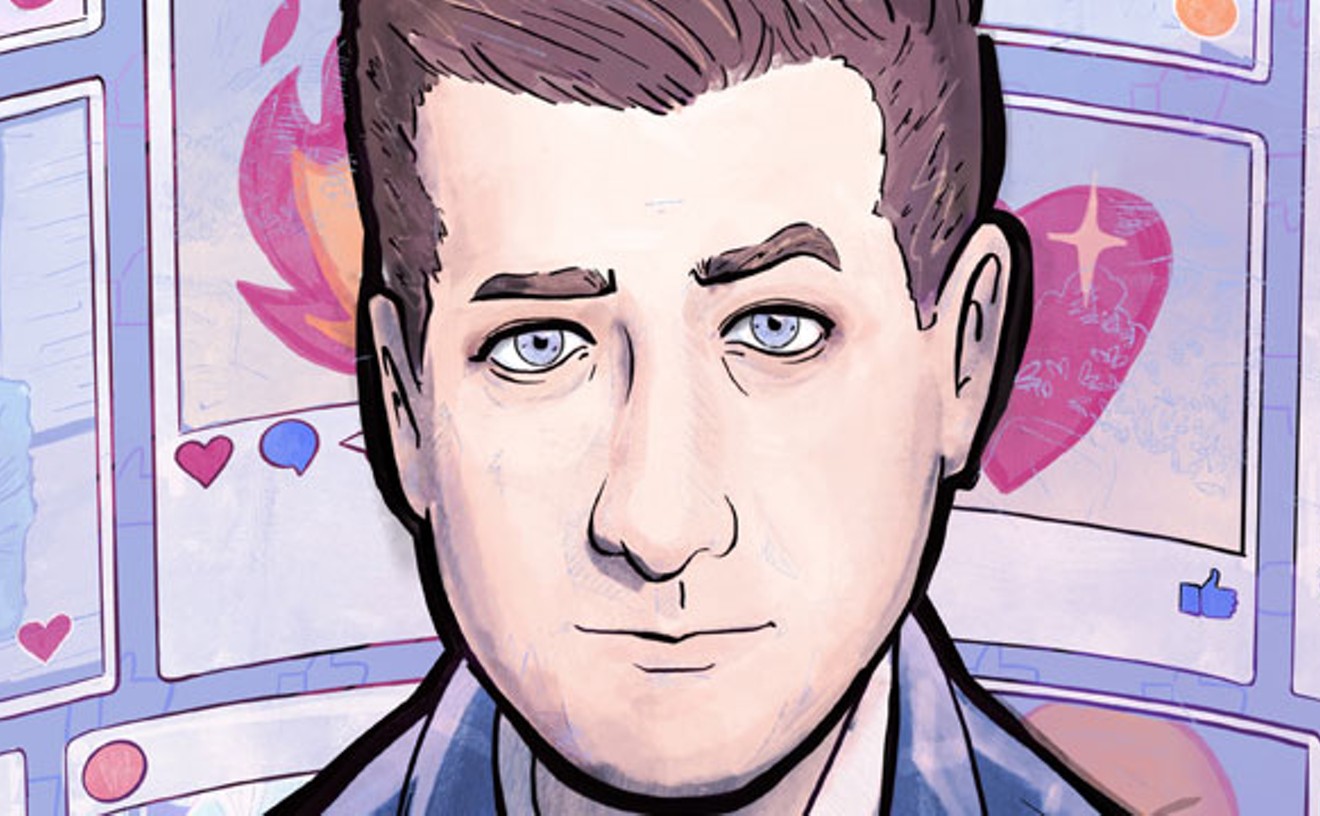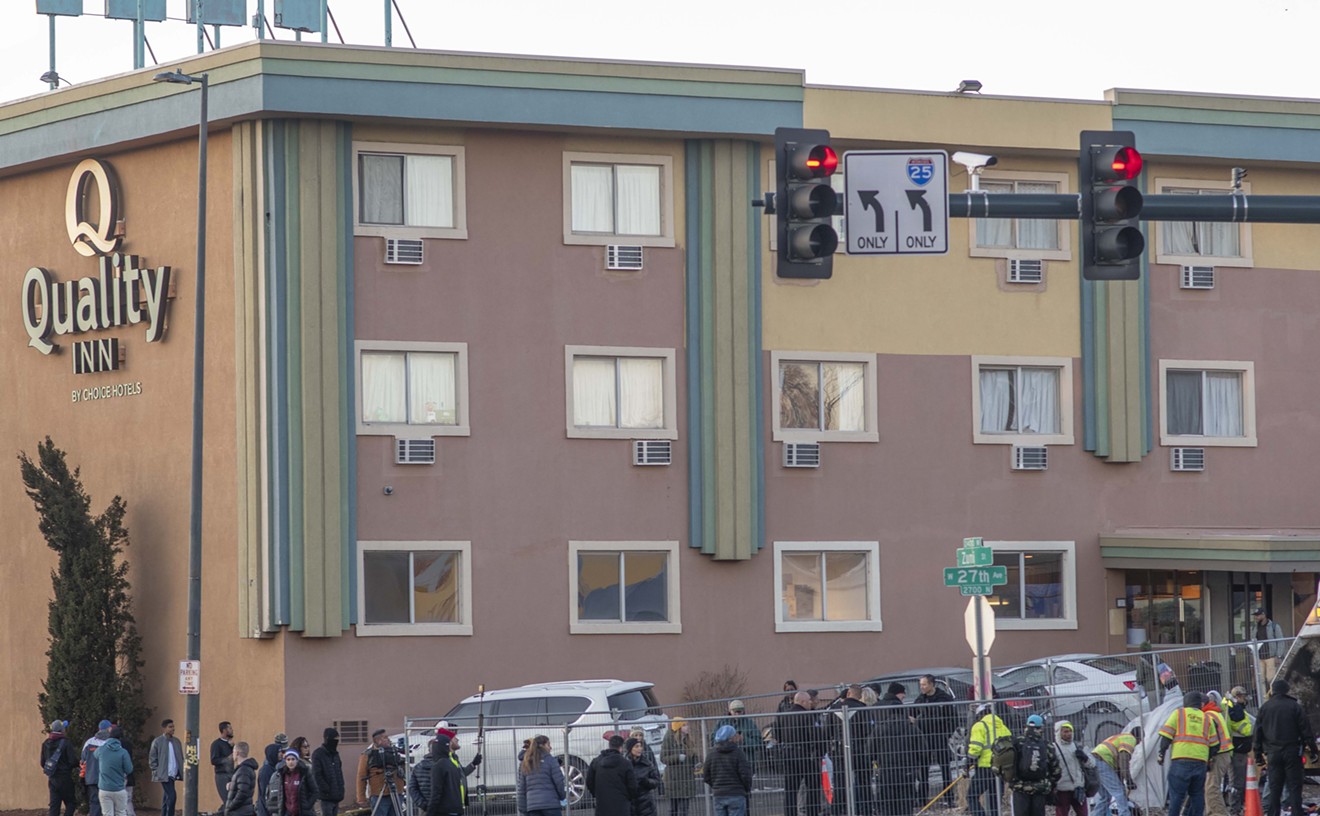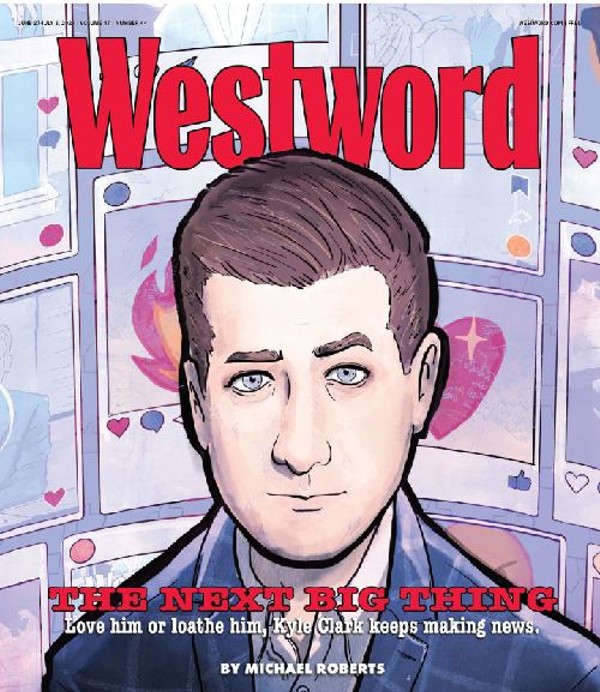Below, find two examples -- the first starring Sandy Travis, sacked last month as co-host of the high-profile morning show on country station KYGO-FM, the other headlined by KOA yakker Russ Johnson, whose recent two-week suspension marks the second time he's gotten bruised after making an impolitic remark about students and violence.
Country roads: The sixty-year-old Travis, a burly cowboy type with a folksy accent, didn't just roll off the turnip truck. He's been a radio pro since 1958 and has served as a country-music broadcaster in Denver since 1977. He signed up as a co-host of the KYGO morning team known as the Waking Crew in 1988, and since then, the program has been consistently popular. Yet in the first half of February, Travis was canned.
Why? Travis couldn't be reached for comment -- and believe me, I've been trying. But a note posted on his Web site, sandytravis.com, reads, "Dear Faithful Listeners...Just want to tell you I got my ass fired for something I said on the air." He adds that "in a couple of days, I will provide an audio file that explains what happened," and mentions plans to do a regular morning show on his site. However, the message hasn't been updated for weeks, and the site remains filled with pages devoted to Sandy and the Crew -- currently, anti-hayseed Jonathan Wylde, who referred all questions to KYGO program director Joel Burke, and non-twangy Kelly Ford, who didn't respond to an interview request.
Meanwhile, speculation continues to swirl about the precise words that led to Travis's downfall. A visitor to Denverradio.net, a site overseen by Rob Hatch that's devoted to the local radio biz, claims the offending comment was "I didn't know that black people lived in Highlands Ranch," which, if true, is a tepid attempt at humor but seems minor by today's shock-jock standards. Station reps neither confirm nor deny the accuracy of this claim, and their silence, many observers believe, suggests that the offending statement or statements were mere excuses to boot Travis out the door. The fact that Burke has been on the job for only about four months seemingly adds credence to this house-cleaning theory.
On the surface, honchos at Jefferson-Pilot, the Greensboro, North Carolina, firm that owns KYGO and four other area stations, would seem to have little reason to make such a change: In just-released winter ratings, KYGO ranked second only to KOA among listeners twelve and older. But the country format has been suffering around the nation of late, as have CD and concert sales associated with C&W artists, and Denver radio has felt the chill. During the past several years, rumormongers have hinted that countless underperforming Denver stations were about to "go country," and several might have were it not for KYGO's strength and the presence of KCKK-FM/Country 104.3, another Jefferson-Pilot property that served to protect its sister station. But when 104.3 ditched country in favor of smooth jazz last year, no competitor jumped in to fill the vacuum -- because there was no vacuum to fill. KYGO's twelve-plus ratings experienced a temporary bump last fall after the switch, but they're presently lower than they've been in any quarter but one since fall 1998.
Hence the arrival of Burke, who started out in country radio but has spent most of the 22 years since then overseeing other styles; most recently, he was the program director for an adult-contemporary station in Memphis, Tennessee. One of the first moves he's made since arriving in Denver (aside from disappearing Travis, which he won't discuss) is hiring weather guy Ed Greene, whose contract at Channel 9 lapsed a few months back. Since Travis's departure, Greene has taken on a greater role with the Waking Crew, and while that's probably just temporary (he's looking for a TV job and is apt to get one soon), it's made the morning show less overtly countrified than it once was.
Burke doesn't say that's his goal: He enjoys discussing the "heritage" of KYGO and feels "very optimistic that the cycle of things is heading back toward country music. I think the end of boy-band music is in sight, and with our strong product, I think people will come back to us." But the artists he believes are leading this charge -- the Dixie Chicks, Faith Hill, Shania Twain -- make music that's appropriate for play on pop stations, too. Bob Call, senior vice president and general manager for Jefferson-Pilot, acknowledges that this pre-sents a challenge for KYGO. "Whereas a few years ago people like Garth Brooks had all their popularity focused on country radio, a number of these artists have found homes on formats like adult contemporary and mainstream Top 40. That can work to our advantage, because it exposes people to artists with a foundation in country music -- and if they like it, they can experience more of it on KYGO. But there's also the danger of them looking at a Faith Hill simply as an entertainer they like, not necessarily as a country artist."
That's not to imply that Burke and Call are panicking, or that more heads at KYGO are likely to be disconnected from their respective bodies soon; the pair argue that KYGO is riding out country's downturn very well and see brighter days ahead. But it does make you wonder: Was Sandy Travis fired at a country radio station for being too country?
Saying the darnedest things about kids: Talk-show host Russ Johnson began working at KOA in October 1999, and even after moving into a regular 10 p.m.-to-1 a.m. weeknight slot, he made hardly a ripple in the local radio market. But that changed, thanks to a February 9 program in which he was debating whether parents really listen to their children -- a topic precipitated by the arrest of three students at Fort Collins's Preston Junior High for allegedly planning to stage a Columbine-like attack at the school. At one point, a Preston Junior High student who'd called Johnson's show in the past joined the discussion from his home, and in an attempt to prove that moms and dads often miss seemingly obvious warning signs of trouble, Johnson prompted the youth to holler, "I want to kill all my classmates!"
For this act of failed hilarity, Johnson, who publicly apologized for the bit, was suspended for two weeks -- and he made the local news for the first time. But upon his return, Johnson was handed an earlier time slot, 7 p.m. to 10 p.m. on weeknights. At first blush, this seems like a promotion for bad behavior, but Don Martin, KOA's program director, denies it, insisting that the move had been in the works prior to Johnson's suspension as part of a complicated schedule shuffle. A satirical program starring Phil Hendrie, which had been heard at 7 p.m. on KOA, was moved to 5 p.m. on KHOW to avoid being preempted by Colorado Rockies baseball coverage -- and as a result, Reggie Rivers's KHOW afternoon-drive program was halved and Hendrie's old time period opened up at KOA. Martin elected to fill the latter with Johnson, who'll be "our accordion man. When the Rockies aren't playing, he'll be on from 7 to 10, and we'll have a variety of people on after him. And when the Rockies are playing, he'll be on after them in his old slot." Martin says the experiment is intended to keep Johnson on the air consistently, since frequent preemptions by the Rockies had previously made the early-evening gig "the place where talk-show hosts went to die."
But Johnson's presence on Denver airwaves remains surprising because of an incident that took place mere months before his hiring at KOA. You see, Johnson was fired by a Kansas City radio station for a controversial remark made just after the original attack on Columbine.
Here's how it happened. On April 27, 1999, less than a week after the Columbine shootings, Mike Murphy, morning-show host at Kansas City talker KCMO, reported that students at a high school there had been sent home early the previous day because of copycat threats that turned up in a chat room; he added that frightened parents who felt more comfortable keeping their offspring home the next day should feel free to do so. Murphy then asked Johnson, who served as his producer and news reader, what he would do if he had kids. According to a report in the Kansas City Star, Johnson replied, "I would say, 'You're going to school.' I'd say, 'Here's a .357 -- if you have any problems, use this.'"
Johnson was fired at KCMO that very day. Bob Zuroweste, the general manager of KCMO at the time, declines to comment about Johnson, but the press release he issued following the incident speaks volumes. In the document, Zuroweste didn't verify that Johnson was fired for his offhand retort (and inside sources reveal that plenty of unrelated politics came into play) but stated, "In light of the gravity of the situation in Littleton, Colo., and its impact nationally, including the local impact on our Kansas City schools and the country at large, we feel Russ Johnson's comments were insensitive, irresponsible and unacceptable for an on-air employee." As for Johnson, he apologized on the air for his slip (even though the station hadn't received any listener complaints), but later turned up for several days on another local station delivering what was dubbed "The .357 Magnum News."
There's no telling how Johnson feels about this today: He was unavailable for comment. And what about KOA? Its staffers went out of their way to attack Howard Stern for tossing out an ill-considered Columbine aside right after the shootings -- and their efforts both behind the mike and behind the scenes are a big part of the reason that Stern was eventually ridden out of town. But program director Martin admits that he knew about Johnson's questionable statement before he hired him -- although he considers the two situations to be "apples and oranges.
"From what I know about it, what Russ said wasn't really Howard Stern-ish," Martin says, "and it wasn't really about Columbine -- and I don't think what he said on my station had anything to do with Columbine, either. It was an asinine thing to do considering everything going on with death and kids in this day and age, and he deserved to be suspended for it. But it wasn't about Columbine."
Martin makes it clear that Johnson will be watched very closely from here on out. Feel better now?
Fanfare for the common man: The acquisition last week of KUNC by a grassroots organization, Friends of KUNC, is as unlikely a media victory as any in recent memory. In just twenty days after the February 8 announcement that the University of Northern Colorado, which owned the station, planned to sell it to Denver-based Colorado Public Radio, the group raised a startling $2 million, topping CPR's initial $1.9 million bid. On the day the offers were due, CPR increased the worth of its package by $600,000, supposedly to fend off Educational Media Foundation, a Sacramento, California, broadcaster interested in expanding into Northern Colorado. Yet this total also happened to match the amount of money in a KUNC endowment fund intended to support the station -- and if CPR had wound up with the signal, contributors to the account would almost certainly have asked for a refund. The promise of such repercussions, not to mention the public-relations bloodbath that would have taken place had the Friends been rejected, eventually got through to UNC president Hank Brown -- and just in time.
Marc McKenzie, a Friends spokesman, knows whom to thank for this triumph: "...the thousands of people who responded, and the over 2,000 people who made contributions, a lot of them from the Denver area. We started this from ground zero just a few weeks ago, which makes what we were able to do really remarkable."
For once, that's not hyperbole.











